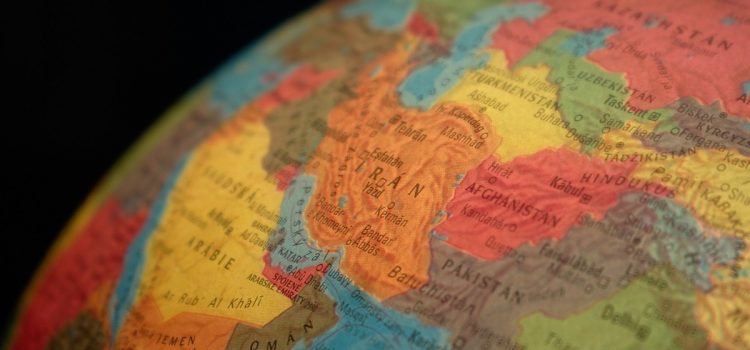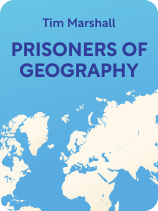

This article is an excerpt from the Shortform book guide to "Prisoners of Geography" by Tim Marshall. Shortform has the world's best summaries and analyses of books you should be reading.
Like this article? Sign up for a free trial here.
Why does China seek out Africa’s resources? Why have India and Pakistan wanted control of Kashmir? Why has Korea been colonized and invaded so often?
Geography shapes the way that nations interact with each other. Tim Marshall explains that, on the international stage, nations use trade, diplomacy, and military force as they vie for access to geographical bounties—troves of resources, trade routes, and defensive features.
Read on to find several examples of geopolitics from Prisoners of Geography.
Examples of Geopolitics
Marshall provides several examples of geopolitics to illustrate various ways that geography shapes how nations interact with one another. Based on its geography, a nation may focus on securing energy resources, securing trade routes, or taking action to secure itself in anticipation of future conflicts.
(Shortform note: The idea that geography shapes relations between nations, also known as geopolitics, has a complicated history. Originally arising in the 1800s, geopolitics was a guiding philosophy for imperial powers. Historians note that geopolitics became an unpopular framework due to the fact that it was associated with Nazi strategy. However, since the 1970s, geopolitical thinking has experienced a resurgence, though in updated forms that are less imperialist.)
Nations Compete Over Energy and Other Resources
On the international level, nations compete for access to geographic resources, most often fossil fuel deposits. Nations that lack the resources to power themselves domestically tend to go beyond their borders to secure energy, whether via conquest or trade.
As an example of a nation looking beyond its borders for resources, Marshall points to Japan’s history. While its geography makes it difficult to invade, Japan lacks significant domestic energy sources. As a result, it has historically invaded the Asian mainland in pursuit of resources.
While in many cases military tactics are used to access foreign energy sources, some states use economic muscle to get the resources they need.
For example, as China’s economy has expanded, Chinese companies have been looking overseas to secure the energy needed to fuel China’s rapid growth. Marshall notes that many of these companies operate in African nations. While the Chinese strategy of using trade to access African resources is less outwardly violent than historical European colonization, the end result is similar. Africa’s resources and wealth are yet again being funneled away to feed the appetite of the world’s wealthiest nations.
Energy Dependence as a Bargaining Chip
According to Marshall, countries that export large amounts of energy can use their relative wealth to influence the countries that depend on them for energy.
Notably, many European nations depend on Russian oil for energy. This makes it difficult for these nations to oppose Russia, in politics or in war, as Russia can choose to cut off its exports to these countries at any time.
Nations Compete to Secure Trade Routes
As they look to secure their energy reserves, nations also seek to secure profitable trade routes. Controlling major trade routes gives nations influence over all the other nations that use those routes, making these routes especially strategically important.
As an example of nations vying for control of important trade routes, Marshall references the Strait of Malacca, which is jointly controlled by Malaysia, Indonesia, and Singapore. China ships massive amounts of oil through the strait, as do many other countries. As a result of the strait’s economic importance, the US and China are both trying to draw Malaysia, Singapore, and Indonesia closer to them.
Along with these economic choke points, Marshall argues that nations strive to gain access to deep harbors that are usable in winter. Russia in particular has no domestic ports that allow it to engage in trade or combat on the seas year-round—while Siberia has several ports, they aren’t usable for much of the winter. Marshall argues that the goal of Russia’s 2014 annexation of Crimea was to gain access to a year-round port on the Black Sea.
Nations Are Always Preparing for International Conflict
Along with pursuing international trade routes and sources of energy, nations are continually preparing themselves for the next international conflict. As we’ll discuss, nations attempt to fortify their defenses by seizing key geographic areas to prepare for war. And, when they can’t directly control certain areas, powerful nations will also compete for regional influence in proxy conflicts, which occur when powerful nations use diplomacy, trade, and military aid to indirectly gain influence abroad.
(Shortform note: Strategic geography is the term for the strategy of controlling specific regions based on the military importance of their geography. Some experts believe that as time goes on, many nations will make outer space a priority in their geographic strategy. As space becomes more crowded, these experts argue, nations will politic for the right to send their satellites into the few, contested areas that remain available.)
Nations Expand to Fortify Their Defenses
Expansion is often driven by a nation’s desire to create a more secure border. As Marshall describes, certain geographic features are easier to defend than others.
(Shortform note: Military strategists note that while geography is less emphasized in their field than in the past, geography is as important to military strategy as ever. They argue that geography is an essential tool for understanding new theaters of combat, such as space and cyberspace.)
As an example of a nation expanding in pursuit of geographic security, Marshall argues that China annexed Tibet to secure its border with India. While India is unlikely to invade China via Tibet due to the immense difficulty of moving troops through the Himalayas, Marshall argues that controlling Tibet gives China a strategic advantage. Tibet’s location in the peaks of the Himalayas gives China the highest ground in any future border conflict.
(Shortform note: In 2020, border tensions between India and China erupted into violence in the Himalayas. Since that time, occasional skirmishes have broken out in the Ladakh region, which both countries purport to own. Commentators believe that the Chinese military was reacting to India’s attempts to establish their own airbase in the Himalayas. Regardless of their motivations, it’s probable that border disputes between the two countries will continue.)
Superpowers Fight to Gain Regional Influence
When powerful nations can’t directly control a strategically important area, they often use diplomacy, trade, or military aid to court influence with the leaders in those areas. Marshall asserts that this is especially common in areas that multiple superpowers want to control. Rather than risk the devastation that would come with open military conflict with a competing superpower, these nations use other methods to build power.
(Shortform note: Some authors contend that while such conflicts had become less common since the end of the Cold War, proxy wars between superpowers are once again on the rise. In recent years, the United States, China, and Russia have deployed privatized military contractors in proxy conflicts around the world. As China continues to grow in both economic and military strength, it’s likely that it will continue to use its newfound might to defend its interests abroad.)
In a prominent and long-running example of a proxy conflict, India and Pakistan have struggled for control of Kashmir since they achieved independence. According to Marshall, Kashmir holds strategic significance for both nations, as it would give each of them a border with otherwise inaccessible nations. Instead of engaging in direct conflict for Kashmir, the two sides battle more covertly for control of the region. Pakistan funds and trains Kashmiri fighters who rebel against the controlling Indian army, as both sides claim to own Kashmir.
(Shortform note: In 2019, the Indian government claimed full control over Kashmir. At the time, it was feared that this would lead to war with Pakistan, but ultimately this didn’t occur. Since claiming control of Kashmir, the Indian government has demolished buildings on over 50,000 acres of land in Kashmir, claiming they were built illegally on state land. Commentators have asserted that the true aim of these tactics is the subjugation of Kashmir’s majority Muslim population. While the Indian government claims that violence in Kashmir has ended, pro-Pakistan militants have continued to violently oppose the government’s authoritarian measures.)
Geography Leaves Some Nations Unprotected
A nation’s geography also determines how susceptible it is to invasion. According to Marshall, countries that have weaker natural defenses tend to have their development frequently and violently interrupted.
(Shortform note: When a country is invaded, its economy may not be the only one affected. Experts have noted that since Russia’s 2022 invasion of Ukraine, global prices of resources such as oil and natural gas have skyrocketed.)
To illustrate how a nation’s geography can leave it vulnerable to invasion, Marshall looks to Korea’s geography. Caught between the regional powers of Japan, China, and Russia, the Korean peninsula has few natural boundaries to prevent invasions from either land or sea. As a result, Korea has been colonized and invaded numerous times throughout its history.
(Shortform note: While Korea’s position between Japan and China has led it to suffer multiple invasions, it also has its benefits. Experts note that Korea’s position between global giants is an economic advantage, which has helped make the Korean economy one of the world’s most productive.)

———End of Preview———
Like what you just read? Read the rest of the world's best book summary and analysis of Tim Marshall's "Prisoners of Geography" at Shortform.
Here's what you'll find in our full Prisoners of Geography summary:
- Why some nations thrive and others struggle with poverty and inequality
- How a nation's geography determines its fate
- Why nations are always preparing for international conflict






